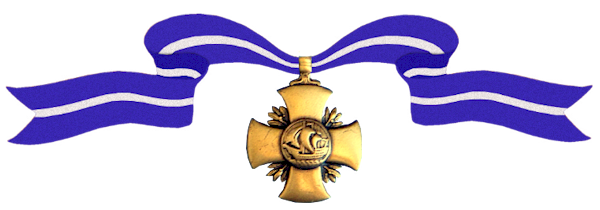George Pierce graduated from the U.S. Naval Academy at Annapolis, Class of 1932. He retired as a U.S. Navy Rear Admiral.

–
Awards Received
-

Navy Cross
-

Navy Cross
-

Legion of Merit
-

Legion of Merit
-
Navy Cross
Service:
United States NavyRank:
CommanderDivision:
U.S.S. Tunny (SS-282)Action Date:
May 28 – July 6, 1945
Commander Submarine Force Pacific Fleet: Serial 02268 (September 11, 1945)The President of the United States of America takes pleasure in presenting a Gold Star in lieu of a Second Award of the Navy Cross to Commander George Ellis Pierce (NSN: 0-71646), United States Navy, for extraordinary heroism in the line of his profession as Commanding Officer of the U.S.S. TUNNY (SS-282), on the NINTH War Patrol of that submarine during the period 28 May to 6 July 1945, in enemy controlled waters in the Pacific War Area. With extreme daring, fully aware of the perils involved in this hitherto un-attempted undertaking, he penetrated strong anti-submarine mine barriers and entered supposedly inviolable enemy waters. He then conducted an aggressive patrol against enemy shipping. At the completion of this special mission he made his exit through heavily mined and patrolled waters and brought his ship back to port safely. His conduct throughout was an inspiration to his officers, his men and to the entire Submarine Service, and was in keeping with the highest traditions of the United States Naval Service.
-
Navy Cross
Service:
United States NavyRank:
CommanderDivision:
U.S.S. Tunny (SS-282)Action Date:
March 5 – April 14, 1945
Commander in Chief Pacific: Serial 030287 (June 15, 1945)The President of the United States of America takes pleasure in presenting the Navy Cross to Commander George Ellis Pierce (NSN: 0-71646), United States Navy, for extraordinary heroism in the line of his profession as Commanding Officer of the U.S.S. TUNNY (SS-282), on the EIGHTH War Patrol of that submarine during the period 5 March to 14 April 1945, in enemy controlled waters in the Pacific War Area. This patrol was devoted to operations of great importance which were successfully completed. In addition, he sank a 200-ton lugger in a well conducted gun engagement. His brilliant tactics enabled him to return his ship safely to port. His conduct throughout was an inspiration to his officers and men and was in keeping with the highest traditions of the United States Naval Service.
-
Legion of Merit

The President of the United States of America takes pleasure in presenting the Legion of Merit with Combat “V” to Captain George Ellis Pierce (NSN: 0-71646), United States Navy, for exceptionally meritorious conduct in the performance of outstanding services to the Government of the United States as Naval Liaison Officer, attached to the United States Eighth Army, in connection with operations against enemy aggressor forces in Korea from 7 September 1952 to 18 July 1953. Throughout this period, Captain Pierce discharged his many responsibilities with exceptional skill and diligence while representing the Navy among the armed forces operating in the Korean Theater. By maintaining close liaison with the intelligence and operations sections of the Eighth Army, he provided vital and timely information to the Commander SEVENTH Fleet for the planning of effective close air strikes and surface gun fire in support of ground forces along the front lines. In April 1953, he served as the Navy Representative during the exchange of prisoners of war. By his inspiring leadership, outstanding professional ability and conscientious devotion to duty, Captain Pierce contributed materially to the success of vital operations against the enemy and upheld the highest traditions of the United States Naval Service. (Captain Pierce is authorized to wear the Combat “V”.)
-
Legion of Merit

The President of the United States of America, authorized by Act of Congress, 20 July 1942, takes pleasure in presenting a Bronze Oak Leaf Cluster in lieu of a Second Award of the Legion of Merit (Army Award) to Captain George Ellis Pierce (NSN: 0-71646), United States Navy, for exceptionally meritorious conduct in the performance of outstanding services to the Government of the United States as Senior Naval Liaison Officer, Headquarters, Eighth United States Army, in Korea, from 31 August 1952 to 22 July 1953. Captain Pierce’s comprehensive knowledge of command relationships and his sound tactical concepts were of great value in advising the Commanding General, Eighth Army, on naval operations, plans and capabilities. His skillful coordination of naval support activities and tactful liaison with representatives of United Nations’ interrelated services and Korean officials enhanced esprit de corps, diplomatic amity, and contributed significantly to the first joint military endeavor against despotic aggression. Captain Pierce’s exemplary achievements and commendable actions reflect great credit upon himself and the military service.

